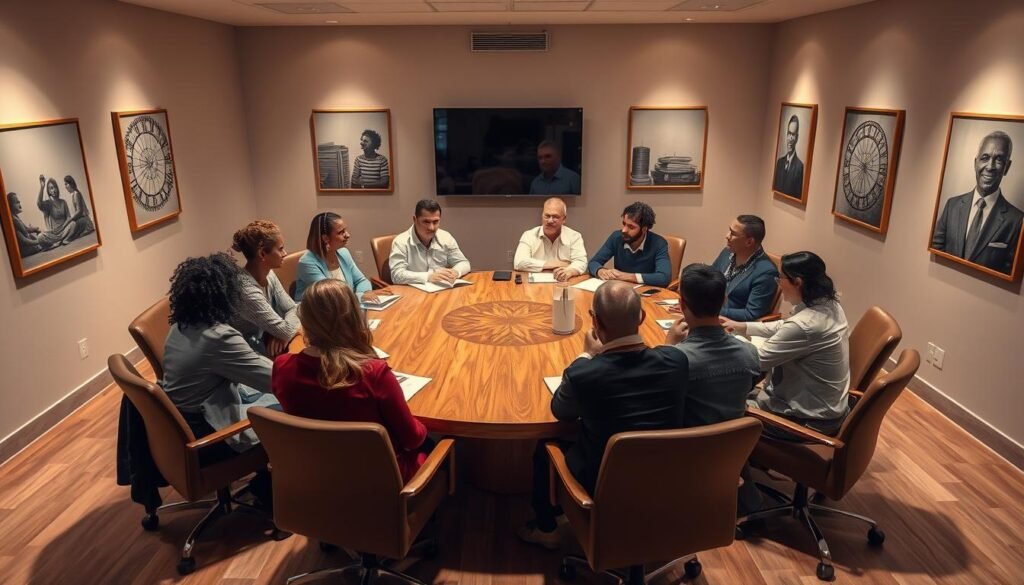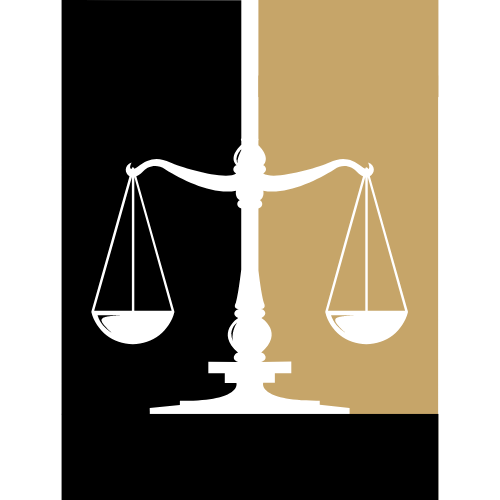Did you know that 90% of all divorces in the United States are now solved through mediation? This big change shows how important peaceful conflict resolution is in family disputes.
In this guide, we’ll look at effective ways to solve family disputes. We’ll help you find peaceful solutions for your family. Whether it’s a divorce, child custody, or other family issues, we’ve got expert advice and practical tips for you.
Key Takeaways
- Understand the benefits of resolving family disputes through mediation and collaborative approaches
- Learn about the role of a mediator and the qualifications they possess
- Discover strategies for preparing for family dispute resolution and managing the process
- Explore alternative dispute resolution methods like collaborative law and family counseling
- Gain insights into the legal considerations and successful resolution strategies for family conflicts
The Importance of Family Dispute Resolution
Family disputes can deeply affect everyone involved, causing emotional stress and strained relationships. They can even lead to legal problems. It’s vital to solve these issues through family dispute resolution to keep family bonds strong and create a lasting peace.
Understanding the Impact of Unresolved Conflicts
Unresolved family disputes can harm individuals and families greatly. They can cause resentment, mistrust, and communication problems. These issues can weaken family unity and affect other areas of life, like work and personal happiness.
Benefits of Resolving Disputes Peacefully
- Improved communication and understanding between family members
- Preservation of family relationships and emotional connections
- Cost-effective and time-efficient solutions compared to lengthy legal battles
- Reduced stress and anxiety for all parties involved
- Collaborative approach that encourages compromise and mutual respect
Choosing family dispute resolution helps families deal with conflicts in a caring and open way. This method not only solves current problems but also builds stronger family ties for the future.
“The greatest weapon against stress is our ability to choose one thought over another.” – William James
Mediation: A Collaborative Approach
Mediation is a strong tool for solving family disputes. It encourages open talks and finding common ground. Unlike court battles, mediation aims to keep family ties strong by finding solutions everyone can agree on.
At the core of mediation is the impartial mediator. This expert helps families talk openly. They guide the conversation, promote listening, and suggest solutions that meet everyone’s needs.
“Mediation allows families to take control of their own destiny, rather than leaving it in the hands of the court system.”
Choosing mediation has many advantages. It focuses on finding common ground, making it faster and cheaper than court. It also helps keep family bonds strong, reducing the stress of legal fights.
Mediation works well for many family issues, like divorce or child custody. It empowers families to solve problems together. This approach can lead to better outcomes for everyone involved.

Family Dispute Resolution
Family dispute resolution is about finding ways to solve problems within families. It aims to keep family ties strong and avoid the harshness of court battles. This approach helps families work together to find solutions.
At the core of family dispute resolution is finding solutions that everyone can agree on. This can happen through mediation, collaborative law, and family counseling. With the help of experts, families can tackle tough issues and find solutions that work for everyone.
Mediation: A Collaborative Approach
Mediation is a key method in family dispute resolution. It involves a neutral mediator helping family members talk and negotiate. This way, everyone gets to have a say in the decisions, making them more likely to stick to the agreements.
Collaborative Law: An Alternative Approach
Collaborative law is another way to solve family disputes. Here, everyone works together with their lawyers to find solutions. It focuses on clear communication and avoiding court battles, helping families deal with issues in a respectful way.
Family Counseling: Addressing Underlying Issues
Family counseling can also play a role in resolving disputes. It helps families understand and work on emotional and communication problems. This can lead to deeper understanding and better solutions for the family.
Choosing the right method for family dispute resolution depends on the family’s situation. By looking at different options and getting help from experts, families can face their challenges with confidence. This can lead to better outcomes for everyone involved.
| Dispute Resolution Method | Key Characteristics | Potential Outcomes |
|---|---|---|
| Mediation | Facilitated negotiation with a neutral third-party mediator | Mutually agreeable solutions, preserved relationships |
| Collaborative Law | Cooperative process with attorneys committed to avoiding litigation | Customized agreements, cost-effective resolutions |
| Family Counseling | Professional guidance to address underlying relationship issues | Improved communication, enhanced understanding |
Exploring different family dispute resolution options can help families find the best way to solve their problems. Whether it’s through mediation, collaborative law, or counseling, these methods offer a way to avoid court battles. They empower families to find solutions that fit their unique needs.
“The best way to resolve family disputes is through open communication, mutual understanding, and a willingness to compromise.”
Types of Family Disputes
Family disputes can take many forms, each with its own challenges. We’ll look at divorce and separation, and child custody and parenting plans. Understanding these complex situations shows why family dispute resolution is key.
Divorce and Separation
Ending a marriage or partnership is emotionally charged. Divorce mediation helps couples deal with legal and practical issues. It leads to solutions that preserve relationships and avoid the harshness of traditional divorce.
Child Custody and Parenting Plans
When a family splits, the children’s well-being is top priority. Custody mediation and parenting plans help parents work together. They ensure children’s needs are met and both parents stay involved.
| Dispute Type | Key Considerations | Benefits of Mediation |
|---|---|---|
| Divorce and Separation |
|
|
| Child Custody and Parenting Plans |
|
|

“Divorce and child custody disputes are never easy, but with the right approach, families can find a path forward that preserves relationships and prioritizes the well-being of all involved.”
The Role of a Mediator
In family dispute resolution, the mediator is key. They act as a neutral third party. Their job is to help families talk openly and find solutions they can agree on. The mediator’s skills and duties are vital for a successful mediation.
Qualifications and Responsibilities
Mediators need many skills to work in family dispute resolution. They must understand family dynamics well, communicate clearly, and stay impartial. They create a safe space for everyone to share their concerns and find solutions.
- Expertise in family law and conflict resolution
- Excellent communication and active listening skills
- Ability to remain impartial and guide the process objectively
- Knowledge of alternative dispute resolution techniques
- Commitment to preserving family relationships and promoting peaceful solutions
The mediator does more than just help families talk. They guide the process, help identify key issues, and encourage honest dialogue. By staying neutral and fostering understanding, mediators are crucial in resolving disputes through mediation, family dispute resolution, and alternative dispute resolution.
“The mediator’s role is to facilitate, not dictate. Their expertise lies in guiding the parties towards a mutually satisfactory resolution, not in imposing their own solutions.”
The success of family dispute resolution depends on the mediator’s skill. They must navigate complex emotions and legal issues. By doing so, they empower families to find peaceful solutions to their disputes.
Preparing for Family Dispute Resolution
Dealing with family disputes can be tough. But, with the right preparation, it can get easier. Whether you’re looking at mediation, collaborative law, or something else, getting your facts straight and knowing what to expect can help a lot.
Gathering Relevant Information
For a successful family dispute resolution, you need all the right info. This includes financial records, parenting plans, and any other important documents. Knowing the facts well helps you negotiate better and make smarter choices.
Setting Realistic Expectations
Family dispute resolution, like mediation or collaborative law, is about working together. It’s key to have realistic hopes about what you can achieve and how long it will take. This helps avoid getting too disappointed and keeps the conversation constructive.
| Considerations for Preparing | Mediation | Collaborative Law |
|---|---|---|
| Financial Records | ✓ | ✓ |
| Parenting Schedules | ✓ | ✓ |
| Emotional Readiness | ✓ | ✓ |
| Legal Counsel | – | ✓ |
Preparing well for family dispute resolution can lead to better results and keep your family close. The aim is to find a peaceful solution that suits everyone.

The Mediation Process
Mediation is a strong tool for solving family disputes. It helps families work together to find solutions. The process is designed to be safe and constructive, where everyone can share their concerns openly.
Creating a Safe Environment
Creating a safe space is key in mediation. Skilled mediators build trust and empathy. They make sure everyone feels respected and can share their thoughts freely.
Facilitating Open Communication
Mediators use special techniques to help families talk openly. They teach active listening and finding common ground. This way, families can understand each other better and find solutions together.
Mediation is a powerful way to solve family disputes. It creates a safe space and encourages open communication. This helps families find solutions that keep their relationships strong and peaceful.
“Mediation allows us to move beyond positions and interests, and find ways to address the underlying needs and concerns of all parties involved.”
Collaborative Law: An Alternative Approach
In the world of family disputes, collaborative law stands out as a different way to solve problems. It focuses on working together and finding solutions that everyone can agree on. This is unlike traditional court battles, which often lead to conflict.
Collaborative law believes that families do better when they avoid court. Instead, they focus on talking openly, understanding each other, and working together to solve their issues. This way, families can keep their relationships strong and make sure everyone’s needs are met.
This method uses a team of experts, like lawyers, financial advisors, and mental health professionals. They help guide the family through the process. This team approach makes sure all parts of the problem are looked at, from money and law to feelings and psychology.
One big plus of collaborative law is that it can save money and time. Families don’t have to spend as much on lawyers and court fees. They can also solve their problems faster.
Also, this method lets families play a bigger role in making decisions. This makes them feel more in control and happy with the outcome. It also helps them work better together in the future, especially if they have kids.
For families looking for a better way to handle disputes, collaborative law is worth considering. It focuses on working together, talking openly, and finding solutions that work for everyone. This can lead to more positive and lasting results.

“Collaborative law is not about winning or losing; it’s about finding the best solution for the family as a whole.”
Family Counseling: Addressing Underlying Issues
Family disputes often stem from deeper issues like communication problems or emotional tensions. Family counseling is key in tackling these problems. It helps families improve how they talk to each other and understand each other better. This is crucial for solving disputes effectively.
Improving Communication and Understanding
Family counseling helps families develop better communication skills. It also encourages empathy and tackles emotional or psychological factors that cause conflict. By enhancing communication and understanding, families can solve problems more constructively.
- Identify and address communication barriers
- Develop active listening techniques
- Explore and validate family members’ emotions and perspectives
- Establish clear boundaries and roles within the family
- Encourage open and honest dialogue
When families communicate better and understand each other more, they can handle disputes more effectively. Family counseling is a crucial first step. It helps families lay the groundwork for lasting peace and conflict resolution.
“Family counseling can be a game-changer in helping families address the root causes of their conflicts and develop the skills needed to resolve disputes peacefully.”
Legal Considerations in Family Disputes
Family dispute resolution tries to avoid the costs and complexity of court. Yet, important legal issues must be addressed. These include child custody, property division, and financial support.
Family disputes involve many legal aspects. The law helps ensure a fair outcome. It’s key to know the family law rules to protect everyone’s rights.
Child custody and parenting plans are critical. The court decides what’s best for the kids. They look at the child’s relationship with each parent and the home environment.
- Property division is also important. Divorce mediation helps with dividing assets and debts fairly.
- The court also decides on financial support. This includes child support and spousal maintenance.
Understanding family law is essential. Experienced family law professionals can guide you. They help find solutions that protect everyone’s rights and keep families together.
Successful Family Dispute Resolution Strategies
Achieving successful family dispute resolution needs effective strategies and techniques. We will look at important strategies like active listening, empathy, compromise, and flexibility. These can help family members solve conflicts and find solutions that everyone can agree on.
Active Listening and Empathy
Active listening and empathy are key in solving conflicts. By listening carefully to each family member and showing empathy, we create a space for understanding and teamwork. This helps reduce tension and encourages everyone to share their thoughts openly, leading to better solutions together.
Compromise and Flexibility
In family disputes, being open to compromise and flexibility is vital. When family members are willing to find solutions that work for everyone, they can tackle tough issues. This approach often leads to better outcomes, keeping family bonds strong and reducing the emotional and financial costs of long disputes.
“Successful family dispute resolution is not about winning or losing, but about finding common ground and creating solutions that work for everyone involved.”
The Benefits of Peaceful Conflict Resolution
Using peaceful ways to solve family disputes, like family dispute resolution, mediation, or collaborative law, has many advantages. These methods help families work together instead of fighting in court. This way, they can keep their relationships strong and save money and time.
Preserving Family Relationships
When families use conflict resolution strategies, they focus on finding solutions that work for everyone. This approach keeps communication open and strengthens family bonds. It’s especially important in situations like divorce, separation, or child custody disputes.
Cost-Effective and Time-Efficient Solutions
Family dispute resolution methods are cheaper and faster than going to court. They save families from the high costs and long wait times of legal battles. This way, families can use their resources to heal and move forward, not just fight.
“Peaceful conflict resolution helps families avoid the emotional and financial toll of drawn-out legal battles, allowing them to focus on healing and rebuilding their relationships.”
The benefits of peaceful conflict resolution go beyond just solving disputes. They help families stay connected and find affordable solutions. This can lead to healthier, more loving relationships in the future.

CHILD CUSTODY RIGHTS: UNDERSTANDING YOUR LEGAL OPTIONS
Conclusion
Family dispute resolution is a strong way to handle conflicts in families. It includes methods like mediation, collaborative law, and family counseling. These help families find peaceful solutions that keep relationships strong and save money.
Successful family dispute resolution needs open communication and compromise. It also requires tackling underlying issues in a constructive way. By doing this, families can overcome even tough disputes and grow closer.
It’s true that finding solutions to family conflicts can be hard. But the benefits of family dispute resolution are huge. With effort, understanding, and a focus on common goals, we can create a better future for our families and communities.
